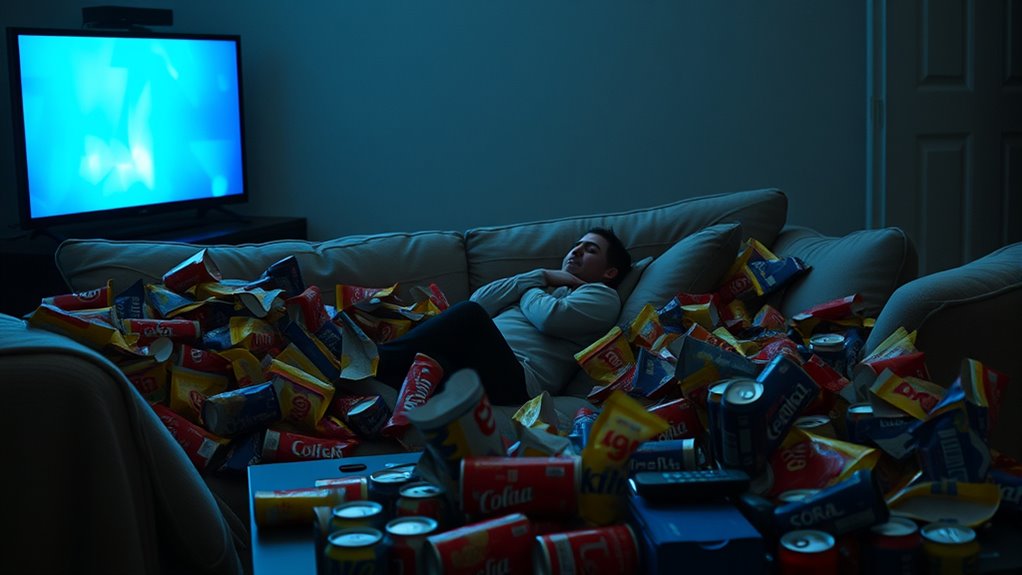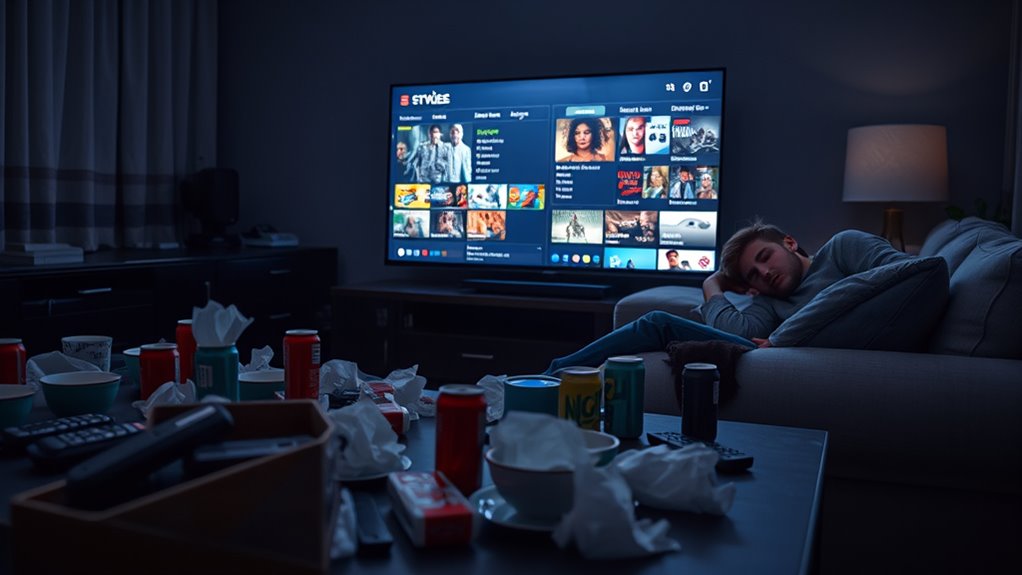Spending 10 hours watching TV floods your brain with dopamine, rewiring it to seek pleasure immediately and making it harder to resist future binge sessions. This reinforces the habit loop, linking activities like snacking or ignoring responsibilities with rewards, which deepens craving and diminishes self-control. Over time, your mood and mental health can suffer, leading to dissatisfaction or depression. Keep exploring to understand how to break free from this cycle and protect your well-being.
Key Takeaways
- Watching 10 hours of TV releases dopamine, reinforcing binge behavior and creating strong emotional bonds with content.
- Extended viewing rewires the brain’s reward system, increasing cravings for immediate gratification and making it harder to stop.
- Prolonged TV sessions can lead to emotional fatigue, dissatisfaction, and increased risk of depression or anxiety.
- Long binge-watching reduces social interactions and physical activity, negatively impacting mental and emotional well-being.
- Over time, habits formed during long viewing sessions can diminish motivation for healthier routines and self-control.

Have you ever wondered why binge-watching entire seasons of shows or devouring entire video game series feels so satisfying? It’s not just about entertainment; it’s about the emotional impact these activities have on your brain. When you immerse yourself in a story or gameplay for hours, your brain releases feel-good chemicals like dopamine, reinforcing the activity and making it addictive. This flood of pleasure creates a powerful emotional connection to the content, encouraging you to keep going long after you intended. Over time, this repeated exposure can lead to habit formation, where binge-watching becomes a default way to cope with stress, boredom, or emotional discomfort.
As you settle into a binge session, your brain starts to associate certain routines with reward. For example, grabbing snacks or ignoring responsibilities becomes part of the habit loop, making it more likely that you’ll choose this activity again and again. This cycle of anticipation and reward is a core component of habit formation, and it’s why breaking free from binge-watching can be so challenging. Your brain begins to crave that dopamine hit, and the longer you indulge, the more entrenched the behavior becomes. It’s almost like your brain rewires itself to prioritize the immediate pleasure over other, healthier activities.
The emotional impact of binge-watching isn’t just about enjoyment; it can also influence your mood and mental health. While you might feel a temporary sense of escape and relaxation, prolonged binge sessions can lead to feelings of guilt, anxiety, or loneliness afterward. Your emotional well-being takes a hit because your brain starts to associate these habits with fleeting happiness rather than sustainable fulfillment. Over time, this can deepen feelings of dissatisfaction or even contribute to depression, especially if binge-watching replaces social interactions or physical activity. Incorporating mindfulness practices can help you become more aware of your habits and manage emotional responses more effectively.
Understanding the connection between emotional impact and habit formation helps you recognize why it’s so hard to cut back once you’ve started. It’s not just about willpower; your brain has adapted to crave the rush of dopamine that comes with binge-watching. If you want to change this pattern, it’s essential to replace it with healthier routines that still provide emotional satisfaction—like exercise, socializing, or engaging in hobbies. Recognizing how your habits are formed gives you the power to reshape them, breaking the cycle of endless screen time and fostering a more balanced, emotionally resilient life.
Frequently Asked Questions
How Does Binge-Watching Affect Sleep Quality and Patterns?
Binge-watching can negatively affect your sleep quality and patterns. As you stay up late watching TV, you experience sleep disruption, making it harder to fall asleep or stay asleep. The blue light from screens suppresses melatonin production, the hormone that regulates sleep. This melatonin suppression delays your sleep cycle, leading to poorer sleep quality and feeling more tired during the day.
Can Excessive TV Watching Lead to Long-Term Cognitive Decline?
Some believe excessive TV watching harms brain plasticity and memory retention over time. Evidence suggests that prolonged sedentary activity can reduce neural flexibility, making it harder to learn and adapt. If you spend many hours glued to the screen, you might experience long-term cognitive decline, as your brain’s ability to rewire and retain information diminishes. To protect your cognition, balance screen time with activities that challenge your brain.
What Are the Mental Health Risks Associated With Binge Culture?
You might find that binge culture risks your mental health by impairing emotional regulation and shrinking your attention span. When you binge-watch for hours, your mood can become unstable, making it harder to manage stress or negative feelings. Additionally, your ability to concentrate decreases, affecting daily tasks and relationships. Over time, this pattern can lead to increased anxiety, depression, and difficulty staying present in the moment.
How Does Binge-Watching Influence Social Interactions and Relationships?
When you binge-watch, you might notice less social interaction, leading to social isolation. Spending hours in front of the screen can also foster emotional dependency, making it harder to connect meaningfully with others. As you prioritize TV time over social activities, your relationships may weaken, and you might feel more lonely. To maintain healthy connections, balance your screen time with face-to-face interactions and social engagement.
Are Certain Genres More Addictive or Harmful Than Others?
Imagine genre addiction as a magnetic pull so strong it feels like it could trap you forever. Some genres, like thrillers or dramas, can be more addictive because they constantly keep you on edge, while harmful content can distort your perceptions and increase anxiety. These genres are often more harmful, making it harder to break free. Be mindful, because certain shows can hijack your mind and damage your well-being.
Conclusion
So, savvy streamer, steer clear of sustained screen sessions. Bingeing blinds your brain to balance, bonding, and brilliance. Break the cycle, breathe, and bask in brisk, beautiful bursts of activity. Remember, moderation makes your mind merrier and more mindful. Don’t let endless entertainment enslave your energy—embrace balance, banish boredom, and boost your brainpower. Binge less, be better, and bring brilliance back to your busy, beautiful brain.










